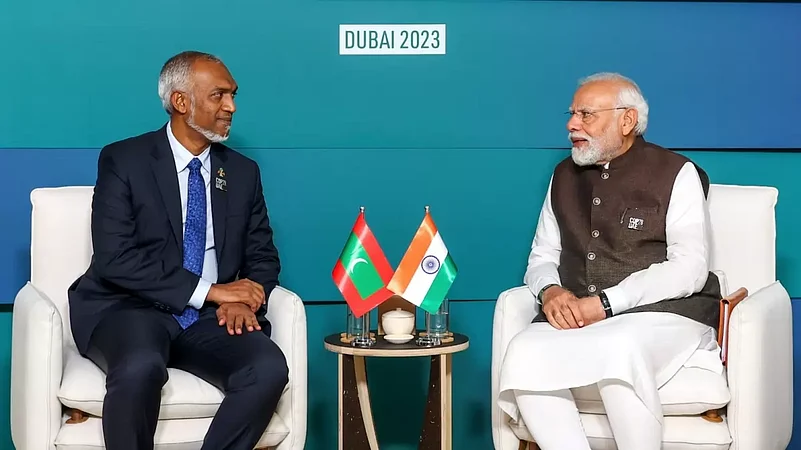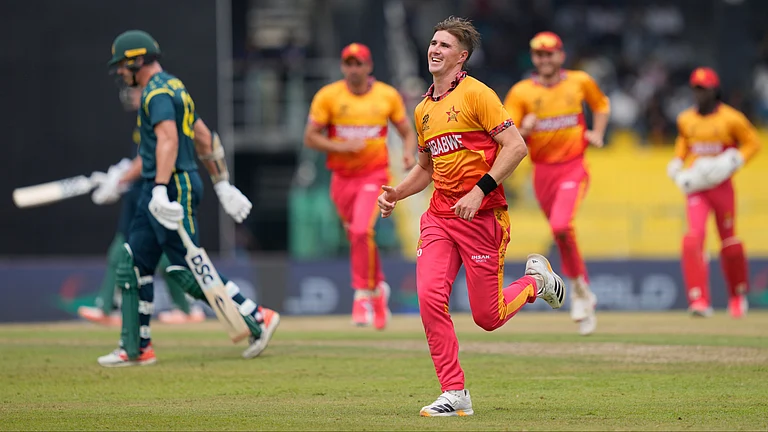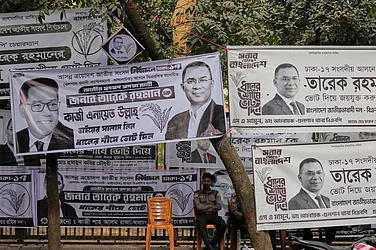The India-Maldives relations, which have already been under strain following President Mohammed Muizzu’s decision to ask New Delhi to remove its military personnel from the island, received a fresh jolt this week. It all played out in the social media.
Prime Minister Narendra Modi during a visit to Lakshadweep posted a video promoting it as a tourist destination. Three deputy ministers of the Muizzu government took on the PM and posted crude comments on his video.
There was a huge outcry in India with people calling for a boycott of the Maldives as a holiday destination. There were also angry reactions from the island as the outcry seemed poised to impact tourism and people’s livelihood. High-end Indian tourists, including actors and cricketers, are frequent visitors to island resorts and are the largest tourist arrivals in the Maldives and the mainstay of the tourism industry. The ‘Boycott Maldives’ move launched by angry Indian citizens at the insult to the Prime Minister had the desired effect. Male reacted.
On Sunday, the three deputy ministers, Malsha Shareef, Mariyam Shiuna, and Abdulla Mahzoon Maajid, were suspended by Muizza’s government. The suspension has mollified nationalistic Indians, but will this incident further sully relations between India and the Maldives? Will the current talks over the return of Indian military personnel from the Maldives be affected by it?
In the see-saw battle for influence in the Maldives between Asian rivals India and China, the 2023 presidential elections threw up Muizzu seen as a pro-Beijing candidate. He won the presidential elections last year on the plank of ‘India Out’ slogan that the opposition had adopted against the Maldivian Democratic Party (MDP) President Ibrahim Solih’s alleged India tilt in foreign policy.
The ongoing incident is done and dusted with the suspension of the three. But now what?
The Maldives is an important island nation in the Indian Ocean and is vital to India’s security interests. The Chinese are already in position on the island, having spread out since the Abdulla Yameen government turned its back on New Delhi. Yameen was defeated in the 2018 presidential elections and Solih of the Maldivian Democratic Party (MDP) rolled back some of the earlier Chinese projects. But last year the MDP was defeated and Muizzu and the China lobby are in. Muizzu is paying an official visit to China from on January 8-11 and will hold talks with President Xi Jinping. Earlier, New Delhi was the first port of call for any new President of the Maldives.
The suspension of the three ministers has helped to cool temperatures. “India and Maldives can get over the current crisis in the relationship by taking the right steps, calming down tensions and taking some practical steps to put the relationship back on track. In this case, the Maldives has taken the right step by suspending the three ministers who made some derogatory comments about the Indian leadership,” says former diplomat Anil Wadhwa. “President Muizzu will need to walk back from his anti-India stance taken during the election campaign so that India can continue to help the Maldives in stabilising its economy and its society.”
Having come to office riding an anti-India wave, Muizzu announced on the first day of taking office that he would abide by his election promise and ask the Indian military to withdraw. According to the Maldivian officials, India has roughly 77 military personnel on the island. There are 24 Indian military personnel to manage the first helicopter, 25 Indians to manage the Dornier aircraft, 26 personnel to manage the second helicopter, and two more for maintenance and engineering, according to the officials. But many of these are civilians working for the maintenance of the equipment.
Anti-India forces on the island see the posting of Indian personnel as the first step in New Delhi’s desire to have a military base and not just a presence in the Maldives. India placed the helicopters and the aircraft to train local pilots and maintenance crew and help in disaster management and security.
Ironically, the proposal was first made by former Maldives President Yameen, who became pro-China during the course of his presidency. The discussions began when he visited India in 2016. “As per the government-to-government agreement and discussions started in 2016, the Dornier arrives! It will engage in humanitarian relief efforts and joint-EEZ surveillance under command and control of MNDF; It proudly dons MNDF colours and crest, and will involve Maldivian pilots in its operations,” the Indian High Commission in Male tweeted in 2020.
India and the Maldives are in talks on the issue at the moment. So far, no final decision has been taken. Male still insists that India take back its military personnel. A compromise may be worked out finally, but, as of now, nothing is certain.
Much will depend on how Muizzu plays his cards. An anti-India rhetoric may have won him the elections, but, once in government, Muizzu would have quickly realised that the country needs the support of both India and China for its development. The President himself dislikes being tagged pro-China and has often loudly proclaimed that he is pro-Maldives and committed to making his island nation self-reliant.



























